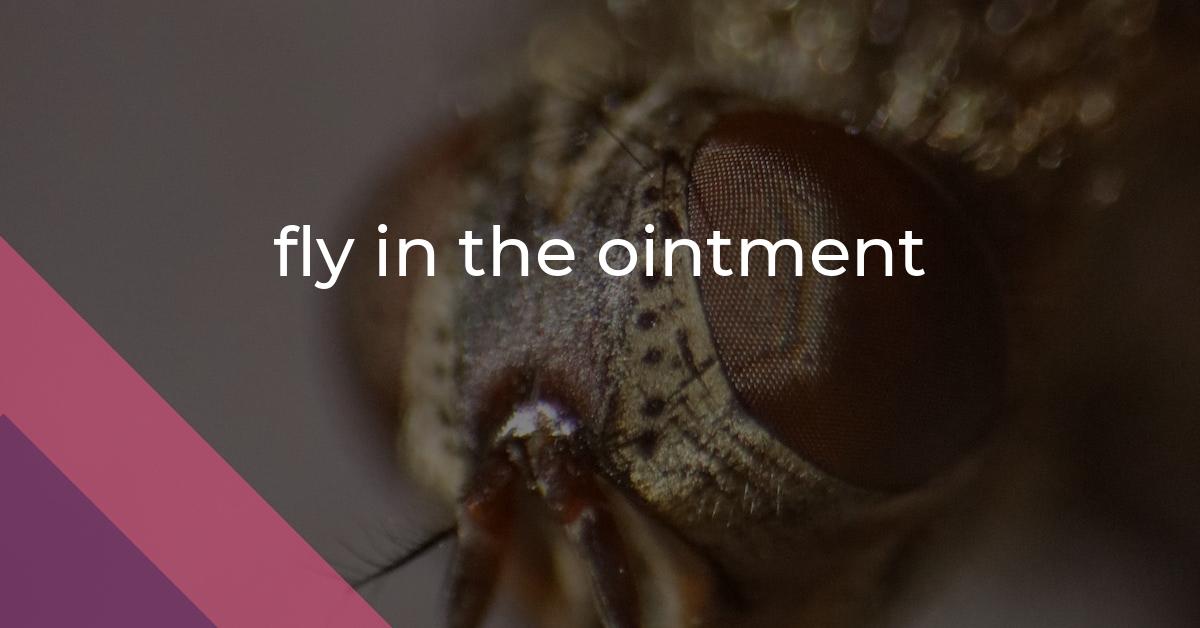fly in the ointment: Idiom Meaning and Origin
What does ‘fly in the ointment’ mean?
The idiom "fly in the ointment" refers to a small but significant flaw or issue that spoils something positive or favorable. It symbolizes how even a small problem can greatly detract from the overall enjoyment or success of a situation.

Idiom Explorer
The idiom "icing on the cake" refers to something that is an additional bonus or enhancement to an already good situation or outcome.
The idiom "go wrong" means that something does not go as planned or expected, and results in a failure or a mistake.
The idiom "fly too close to the sun" refers to the Greek myth of Icarus, who ignored warnings and flew too high, resulting in his downfall. It means to take excessive risks or pursue ambitions without considering the potential consequences.
The idiom "fly out of the traps" means to start or move quickly, often with enthusiasm or energy. It is typically used to describe a person or thing that begins a race or competition swiftly.
The idiom "fly off" means to leave or depart quickly, often with great speed or urgency.
The idiom "fly by" means to pass quickly or to happen very fast, without much notice or time to react. It is often used to describe how time seems to go by rapidly or how an event or opportunity is missed because it happened too quickly.
The idiom "fish in troubled waters" means to take advantage of a difficult or chaotic situation for personal gain or advantage.
The idiom "fine feathers make fine birds" means that a person's appearance or external qualities can deceive others into thinking they possess admirable qualities or skills. However, this may not always be the case, as true value lies within a person rather than their outward appearance.
The idiom "find fault" means to discover or point out mistakes, flaws, or problems in something or someone. It suggests a tendency to focus on the negative aspects or to excessively criticize without considering the positive aspects.
Insightful Obstacle
The idiom "fly in the ointment" is a commonly used phrase that describes a small problem or flaw that exists within an otherwise perfect or positive situation.
The origin of this idiom can be traced back to a biblical reference in the Old Testament of the Bible, specifically in the book of Ecclesiastes. In Ecclesiastes 10:1, it is written that "Dead flies putrefy the perfumer's ointment, causing it to send forth a foul odor." This biblical allusion to the presence of flies contaminating an ointment has since evolved into the idiomatic expression "fly in the ointment."
The meaning of the idiom is clear and straightforward. It refers to a small, unexpected, and often undesirable aspect of a situation that detracts from its overall appeal or success.
Another related idiom that has a similar meaning is "devil lies in the details." This idiom implies that there may be hidden problems or complications in the smaller, often overlooked aspects of a situation. Just like a fly in the ointment, these hidden problems can taint and diminish the overall positive experience.
The idiom "devil is in the details" is another related phrase that conveys a similar idea. It suggests that the true challenge or difficulty of a task lies in the smaller, often overlooked details. These details can be like flies in the ointment, causing problems and hindering the overall success or effectiveness of a situation.
In both of these related idioms, the focus is on the smaller, often unnoticed aspects that can have a significant impact on the overall outcome or experience. It serves as a reminder to pay attention to the details and address any potential issues before they become major problems.
It's important to note that the idiom "fly in the ointment" is commonly used in both literal and figurative contexts. In a literal sense, it can refer to a physical flaw or defect that hinders the functionality or value of an object. For example, a minor defect in an otherwise perfectly functioning electronic device can be described as a fly in the ointment.
In a figurative sense, the idiom is often used to describe an unforeseen problem or complication that arises in an otherwise ideal situation. This could be a negative aspect of a generally positive event, such as a disagreement among friends during a celebratory gathering. These unexpected issues can be like flies in the ointment, detracting from the overall positive experience.
The idiom "fly in the ointment" is widely used in English-speaking countries, including the United States, and is recognized by a majority of native English speakers. It is frequently employed in both casual conversations and more formal writing to convey the notion of a small flaw or problem amidst an otherwise favorable situation.
Furthermore, the idiom can be used in a variety of contexts, such as personal relationships, business dealings, or even everyday situations. For instance, it could be used to describe a minor setback in a business plan, an unexpected issue in a romantic relationship, or an annoyance during an otherwise enjoyable vacation.
The idiom "fly in the ointment" refers to a small negative aspect or flaw that exists within an otherwise positive or perfect situation. Its origins can be traced back to a biblical reference in the book of Ecclesiastes. The idiom is widely recognized and used in English-speaking countries, including the United States. It is employed both literally and figuratively to describe a minor setback or problem that detracts from the overall appeal or success of a situation. As with a fly in a jar of ointment, this flaw contaminates and diminishes the overall experience.
Example usage
Examples of the idiom "fly in the ointment":
- There was a fly in the ointment when the concert was abruptly cancelled due to bad weather.
- He was enjoying his vacation until a disagreement with his friend became the fly in the ointment.
- The plan was going smoothly until a lack of funding became the fly in the ointment.
More "Problems" idioms



